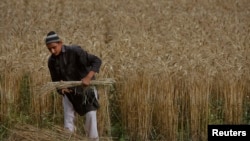The United States Department of Agriculture (USDA) has organized a series of workshops for engineers and agricultural professionals from the On Farm Water Management (OFWM) directorate, and the South Asian Conservation Network (SACAN) to teach the latest techniques in irrigation by using small ponds for long-term water storage, and solar-powered drip irrigation.
USDA civil engineers worked alongside workshop participants to build the capacity of Pakistani farmers to develop sustainable, environmentally-friendly techniques to improve water usage, and reduce farmer reliance on the electrical grid.
“Water is a limiting factor in agriculture,” said Jon Fripp, a civil engineer from USDA’s Natural Resources Conservation Service. “On-farm water storage techniques, such as ponds, and conservation techniques, like solar-powered drip irrigation, are important tools for maximizing the efficient use of water, as well as improving agricultural resiliency to adverse climate conditions.
Storing water so you can have it and use it when you most need it enables farmers to irrigate their crops at the right time, and drip irrigation allows them to get water where it needs to be with minimal waste. Using the free power provided by the sun to get water to the plants reduces cost overall.”
The first set of workshops, which were focused on the creation of small reservoirs of water for use in irrigation, were recently conducted over several days in partnership with the International Water Management Institute (IWMI), the International Center for Agricultural Research in the Dry Areas (ICARDA). The second set of workshops sponsored by ICARDA trained participants to power efficient drip irrigation systems using solar power in lieu of gas generators or local electrical grids.
Trainees participated in hands-on activities designed to demonstrate appropriate ways to dam small ponds to create a stable water source for crops, and learned the latest in utilizing solar energy to power efficient drip irrigation systems, reducing the strain on generators and electrical grids in rural areas. The United States is proud to work with its international partners to help the Pakistani farmers meet their critical water and energy needs.






